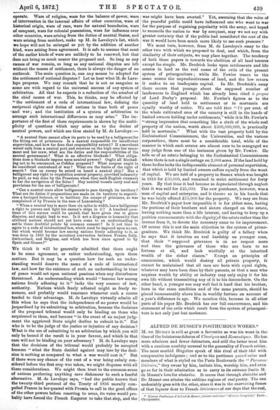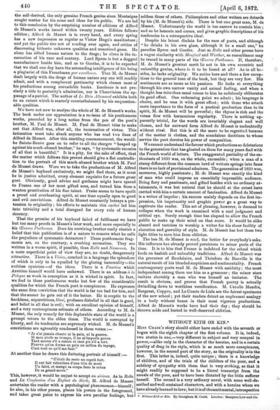ALFRED DE MUSSET'S POSTHUMOUS WORKS.*
M. DE MIISSET is still as great a favourite as was his wont in the time of the boisterous debates of Classiques and Romantiques. He has more admirers and fewer detractors, and still the latter treat him, with a cautious acerbity unusual to the generality of French critics.. The most morbid Hugoites speak of this rival of their idol with. comparative indulgence ; and as to the partisans quand -lame and members of what is styled on the Paris Boulevards the "Parnasse- littlraire," they swear by him, imitate him, worship him, and even. go so far in their admiration as to carry to its extreme limits M. de Musset's love for absinthe. It seems that through absinthe and De Musset one attains the sublime regions of real poetry. The one undeniably goes with the other, since it was in the enervating fumes of that liqueur dear to French littirateurs of our days that the real, * a'uvres Posthuntes Avred *Mussel, falsant suite aux " ("Enures Completes." Paris .. Charpentier.
the self-derived, the only genuine French genius since Montaigne sought matter for his muse and ideas for his public. We are led to this conclusion by the surprising number of editions of Alfred de Musset's works issued within twenty years. Edition follows edition ; Alfred de Musset is in every hand, and every spring
has a new impression as regular as Victor Hugo's manifestoes ; and yet the public tire not of reading over again, and critics of discovering hitherto unknown qualities and unnoticed gems. He
alone has sifted human nature to the dregs ; he alone is the in- carnation of his race and century. Lord Byron is but a doggrel manufacturer beside him, and as to Goethe, it is to be expected
that we shall one day have the astounding intelligence of his being a plagiarist of this Frenchman par excellence. That M. de Musset dealt largely with the dregs of human nature any one will readily admit, and with a complacent pertinacity which classes most of his productions among unreadable books. Insolence is not pre- cisely a title to posterity's admiration, nor is Chauvinism the ap- panage of a patriot. The author of Le Rhin Allemand exhibits both
to an extent which is scarcely counterbalanced by his unquestion- able qualities.
We have not now to analyse the whole of M. de Musset's works. The book under our appreciation is a re-issue of his posthumous works, preceded by a long notice from the pen of the poet's brother, M. Paul de Musset. M. Paul de Musset tries to make out that Alfred was, after all, the incarnation of virtue. This intimation must take aback anyone who has read two lines of Alfred de Musset. After this startling commencement, the would- be Sainte-Beuve goes on to refer to all the charges "heaped up against his much-abused brother," he says, "by systematic enemies
of all that is beautiful." It is a pity, for the sake of effect, that the matter which follows this protest should give a flat contradic- tion to the portrait of this much-abused brother which M. Paul de Musset draws. Were we to take the productions of M. Alfred de Musset's boyhood exclusively, we might find there, as it must be in justice admitted, every element requisite for a future great poet. Obviously, good advice and guidance might have spared
to France one of her most gifted sons, and turned him from a wanton prostitution of his fine talent. Praise seems to have spoilt
a proud and overbearing spirit, at one time equally open to good and evil convictions. Alfred de Musset constantly betrays a pre- tension to originality ; his efforts to maintain this cachet led him into triviality and a total disregard for every rule of human
decency.
That the promise of his boyhood failed of fulfilment we have but too many proofs in Musses later work, and more especially in his G'uvres Posthumes. Does his surviving brother really cherish a
belief that this publication is of a nature to remove what he calls
the prejudices of systematic detractors ? These posthumous frag- ments are, on the contrary, a crushing accusation. They are written in a worse spirit, if possible, than Rolla and Namouna. In a mere superficial point of view they are, no doubt, dangerously attractive. There is a Vision, couched in a language the splendour of which is only to be equalled by the glaring immorality—the ruthless cynicism—of the ideas. There is a Faustine which .Arettino himself would have eschewed. There is an address a is Pologne as weak in conception as it is wicked in spirit. In fact, we find in these posthumous works but few of the considerable
qualities for which the French poet is conspicuous. He expresses the same firm conviction that the world is far too bad for him, and that the sooner he gets out of it the better. He is sceptic to the
backbone, superstitions, blase, professes disbelief in all that is good, and belief in all that is evil ; with an excellent opinion of himself, and a very contemptuous estimate of others. According to M. de Musset, the only remedy for this deplorable state of the world is a
prompt return to the olden times. The world is corrupted by liberty, and its tendencies are supremely wicked. M. de Musset's convictions are agreeably condensed in these verses :-
"Jo jamais chante ni la pais, ni la guerre.
Si mom siècle se trompe, ii no m'importe guere. Taut mien: s'il a raison et tent pis s'il a tort. Donn-a qu'on dorms en pia an milieu da tapage,
C'est tout ce me taut" At another time he draws this flattering portrait of himself :— "C'etait du rests tin esprit fort. Ii eat fait volontiers d'une tete de mort Un falot, et mange as soupe dans le crane De ea grand-mere."
This, however, it would be unjust to accept an serieux. As in Rolla And La Confession d'un Enfant du Siecle, M. Alfred de Musset . entertains the reader with a psychological phenomenon—himself ; be also, in his other poems, places his person in the foreground, and takes great pains to express his own peculiar feelings, but
seldom those of others. Philosophers and other writers are dotards by his (M. de Musset's) side. There is but one great man, M. de Musset. Unfortunately the world is too narrow to contain him ; and so he laments and curses, and gives graphic descriptions of his tendencies to a retrospective ideal.
Despite his latent disdain for the race of poets, and although "he drinks in his own glass, although it be a small one," he parodies Byron and Goethe. Just as Rolla and other poems have a vague similarity with Manfred and Werther, so resemblance may be traced in many parts of the (Enures Posthumes. If, therefore, M. de Musset's greatest merit lie not in his own eccentric and unhealthy genius, where is it to be found at all? As in all be- sides, he lacks originality. We notice here and there a few excep- tions to the general tone of the book, but they are very few. His sentiments are as mean as his passions. He looks at everything through his own narrow vanity and animal feeling, and when a thought less trite than usual comes to him he sedulously obliterates its good effect. One redeeming point we admit ; his language is choice, and he uses it with great effect ; with those who attach more importance to the form of a poetical production than to its spirit, M. de Musset will be powerful ; the rhyme is rich and the verses flow with harmonious regularity. There is nothing ap- parently trivial, for the words are invariably elegant and well chosen, and for outward form Alfred de Musset is undoubtedly without rival. But this is all the more to be regretted because of the matter it clothes, and the scandalous doctrines to whose service the poet devotes his power of composition.
We cannot understand the favour which productions so deleterious to the generation that has gloated on them for many years find with the French world of letters. The exaggerated partiality of the en- thusiasts of 1830 was, on the whole, excusable ; when a man of a stamp different from the common herd of writers springs into fame there is no lack of provisional admirers. The generation of 1830 was, moreover, highly passionate ; M. de Musset was exactly the kind of man who could impress an essentially impressible audience. Being fiery and passionate, and gifted besides with no ordinary at- tainments, it was but natural that he should at the outset have carried with him a certain amount of fascination. Alfred de Musset is a writer of impulse ; his success mainly depends on the first im- pression, his impetuosity and graphic power go a great way to captivate the reader. This art of pleasing, however, is doomed to collapse when the work is examined with a cool judgment and critical eye. Surely enough time has elapsed to allow the French public to make up their mind on that score. It would be alike absurd and tasteless to worship a writer for his sheer facility of elocution and garrulity of style. M. de Musset has but these two light titles to save him from oblivion.
The less M. de Musset is read, the better for everybody's sake. His influence has already proved pernicious to minor poets of the time. It is to him that France is indebted for the school which feeds on hashish and unhealthy traditions. Alfred de Musset was the precursor of Baudelaire, and Theodore de Banville is the natural result of his blended scepticism and sentimentality. French contemporary poets read M. de Musset with assiduity; the most independent among them use him as a grammar ; the minor stars imitate slavishly a man who was himself an imitator. The result is obvious, and proves that French poetry is actually dwindling down to worthless versification. M. Catulle Mendes, Bergerat, Coppee, and Le Comte de Lisle are the fairest specimens of the new school ; yet their readers detect an unpleasant analogy to a body without bones in their most vigorous productions. Alfred de Musset's works have had their day ; they should be thrown aside and buried in well-deserved oblivion.



































 Previous page
Previous page